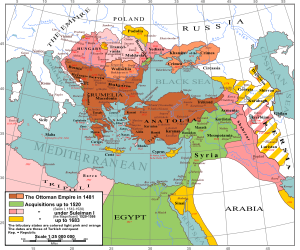The 1534 capture of Baghdad by Suleiman the Magnificent of the Ottoman Empire from the Safavid dynasty under Tahmasp I was part of the Ottoman–Safavid War of 1532 to 1555, itself part of a series of Ottoman–Persian Wars. The city was taken without resistance, the Safavid government having fled and leaving the city undefended.[2] Baghdad's capture was a significant achievement given its mastery of the Tigris and Euphrates rivers and their international and regional trade.[3] It represented, along with the fall of Basra in 1546, a significant step towards eventual Ottoman victory and the procurement of the lower Mesopotamia, the mouths of the Euphrates and Tigris rivers, opening a trading outlet into the Persian Gulf.[4] The Ottomans wintered there until 1535, overseeing the reconstruction of Sunni and Shia religious shrines and agricultural irrigation projects. Suleiman returned to Constantinople, leaving a strong garrison force.[2] Over the next few decades, the Ottomans solidified their control over the region, incorporating it into their empire until it was recaptured by the Persians in 1623.[2]
| Battle of Baghdad (1534) | |||||||||
|---|---|---|---|---|---|---|---|---|---|
| Part of Ottoman–Safavid War (1532–55) | |||||||||
 Suleiman's conquests in the 1532–55 Ottoman-Safavid war gave him access to the Persian Gulf. | |||||||||
| |||||||||
| Belligerents | |||||||||
|
|
| ||||||||
| Commanders and leaders | |||||||||
|
|
| ||||||||
See also
editReferences
edit- ^ Jaques, Tony (2007). Dictionary of Battles and Sieges: A Guide to 8,500 Battles from Antiquity Through the Twenty-First Century. Vol. 1: A-E. Westport, Connecticut: Greenwood Press. p. 95. ISBN 978-0-313-33537-2.
- ^ a b c World and Its Peoples: The Middle East, Western Asia, and Northern Africa. London: Marshall Cavendish. 2006. p. 193. ISBN 0-7614-7571-0.
- ^ Masters, Bruce Alan (2009). Encyclopedia of the Ottoman Empire. New York: Facts on File. pp. 280, 428. ISBN 978-0-8160-6259-1.
- ^ Matthee, Rudolph P. (1999). The politics of trade in Safavid Iran: silk for silver, 1600-1730. Cambridge, UK: Cambridge University Press. p. 17. ISBN 0-521-64131-4.